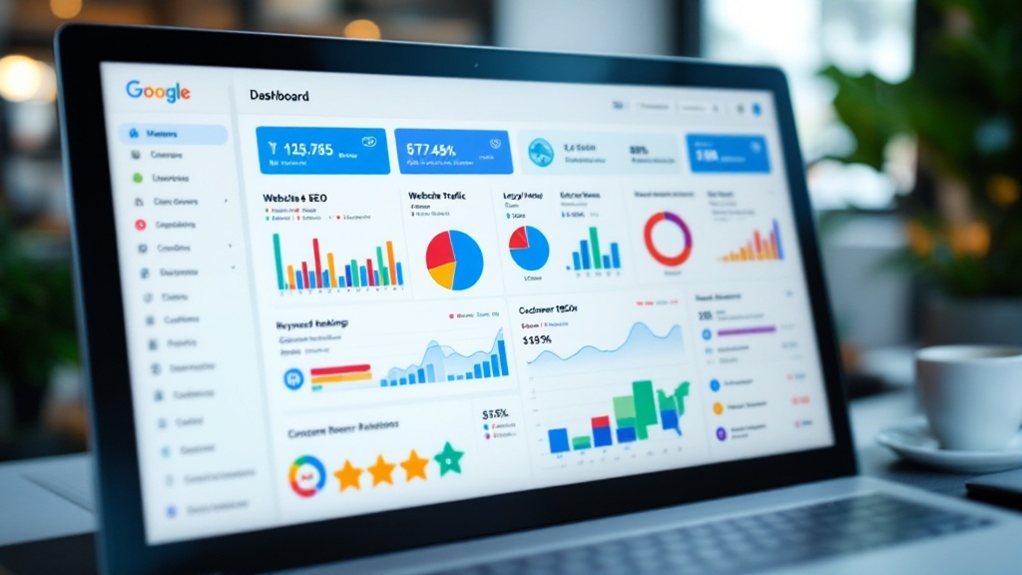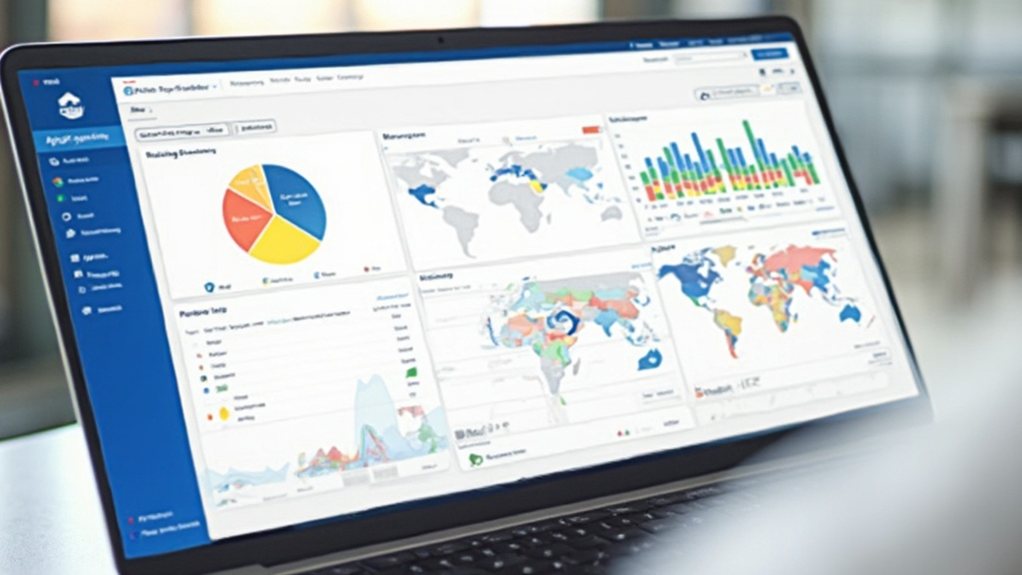To track and measure SEO performance for each of your business locations, leverage a mix of local SEO metrics, traditional SEO tools, and location-specific analytics. Monitor key insights like local search rankings, Google Business Profile data, website traffic, citations, and reviews. Set measurable goals, analyze performance trends over time, and optimize each location independently. This will provide the essential data to drive consistent growth and identify areas for improvement across your locations. If you'd like to dive deeper into optimizing local SEO, continue exploring the provided research outlines.
Identifying Key Local SEO Metrics

When it comes to local SEO, you'll need to identify and track key metrics to gauge the performance of your efforts. Understanding local search rankings is essential, as it reflects your business's visibility in local search results. Tracking local search rankings can help you identify opportunities to improve your positioning. Google Business Profile Insights provide valuable data on how customers interact with your online presence, while website traffic analysis helps you understand the impact of local searches. Monitoring local citations and customer reviews can also influence your local SEO. By tracking these metrics, you can make data-driven decisions to improve your local SEO strategy and better reach your target audience.
Leveraging Traditional and Local SEO Tools

To effectively boost your local SEO performance, you'll need to leverage a combination of traditional and specialized local SEO tools. Google Business Profile Insights, Moz Local, and BrightLocal can provide valuable data on your local presence. Meanwhile, tools like Ahrefs and SEMrush offer insights into your overall SEO, from backlinks to keyword rankings. Tracking and measuring the performance of each business location is crucial for implementing a successful multi-location SEO strategy.
| Local SEO Tools | Traditional SEO Tools | Combined SEO Tools |
|---|---|---|
| Google Business Profile Insights | Content Optimization | Google Search Console |
| Moz Local | Backlink Management | Google Analytics |
| BrightLocal | Domain Authority Metrics | Ahrefs and SEMrush |
Setting Realistic Goals for Improving Local SEO

Establishing measurable objectives is key to improving local SEO. Align your goals with broader business objectives to ensure SEO efforts contribute to overall success. Consistently monitor progress and adjust strategies as needed to maximize impact. Tracking key metrics like website traffic, lead generation, and customer engagement can help identify areas for improvement and make data-driven decisions.
Establish Measurable Objectives
Defining clear, measurable objectives is crucial when aiming to improve your local SEO performance. Focus on increasing organic traffic, keyword rankings, and conversion rates specific to each business location. Utilize tools like Google Analytics and Google Search Console to monitor your progress, and create a goal charter to outline your targets. Monitoring local citations and ensuring accurate business information on these sites can also boost SEO efforts.
| Metric | Objective |
|---|---|
| Organic Traffic | Increase by 20% year-over-year |
| Keyword Rankings | Improve top 3 rankings by 30% |
| Conversion Rates | Boost by 15% for each location |
Additionally, track key performance indicators such as click-through rates, customer reviews, and geographic performance to refine your strategies and maximize your local SEO success.
Align With Business Goals
Aligning your SEO efforts with your business goals is crucial for driving meaningful results. Whether you're aiming to increase sales, generate more leads, or enhance brand visibility, your SEO strategy should be tailored to support these core objectives. Setting smart, achievable SEO goals is essential for maximizing the success of your local SEO campaign. Consider the following:
- Local Relevance: For local businesses, focus your SEO on improving visibility and attracting more customers within your geographic area.
- Revenue Targets: Set specific revenue goals that you can use to measure the impact of your SEO initiatives on your bottom line.
- Return on Investment: Regularly evaluate the ROI of your SEO efforts to ensure they're contributing positively to your business growth.
Monitor Progress Consistently
Consistently monitoring your local SEO progress is key to driving meaningful improvements. Track critical metrics like local pack rankings, organic rankings, Google Business Profile insights, local citations, and customer reviews. [Leverage data analysis tools like Google Analytics, Google Search Console, Local Falcon, and Moz Local to regularly scan and monitor your local SEO performance.] Use location-specific data to identify trends and adjust your strategies accordingly. Regularly reviewing competitor reports and performance trends will help you set realistic goals, whether it's increasing local search visibility or improving customer engagement. Continuously evaluating your progress and adjusting your tactics is essential for sustained local SEO success. [Tracking and monitoring your local SEO performance across multiple locations is crucial for understanding the unique needs and opportunities for each of your business locations.
Analyzing Performance Trends Over Time
Analyzing performance trends over time is crucial for evaluating the effectiveness of your SEO efforts. Conducting quarterly performance reviews allows you to assess progress and make timely adjustments to your strategies. Year-over-year comparisons provide valuable insights into consistent trends, while monthly SEO audits ensure consistency and accuracy across all platforms. Integrating Google Analytics and Search Console data gives you a comprehensive understanding of website interactions and search traffic, empowering you to make informed decisions. Ensuring consistent NAP (name, address, phone) information across the web for each location is also important for tracking multi-location SEO performance.
Optimizing Each Business Location Independently
Optimizing each of your business locations independently is crucial for driving local search visibility and customer engagement. By creating unique, location-specific content, you can improve local search rankings and better connect with your target audience. Incorporate location-specific keywords, highlight staff and local promotions, and use schema markup to enhance your visibility in local results. Closely monitoring SEO results allows for understanding whether the approach is on the right track or needs to be changed. Ensure accurate and consistent NAP information across your Google Business Profiles, and encourage customer reviews to boost local credibility. Leverage local SEO tools and platforms to track performance, analyze competitors, and identify optimization opportunities for each location. Implement location-based marketing strategies to reach and engage with your local communities effectively.
Ensuring Consistent NAP Across Local Listings
Ensuring your business's Name, Address, and Phone number (NAP) information is consistent across local listings is a foundational aspect of effective local SEO. Correct NAP for all listings across the internet is crucial for local SEO. Accurate NAP data enhances search engine trust, boosts your competitive advantage, and improves customer experience. To maintain NAP consistency:
- Utilize a centralized database to manage up-to-date business information across platforms.
- Implement local business schema markup to increase search engine understanding of your data.
- Regularly audit your listings and monitor online reviews to identify and correct any discrepancies.
Consistent NAP is crucial for improving local search rankings, driving customer engagement, and building long-term trust with your audience.
Building High-Quality Local Citations
Building high-quality local citations is essential for elevating your business's online presence and search engine visibility. Leveraging directories like Yelp and Angie's List can provide structured citations, while social media platforms offer unstructured ones. Joining local associations or the Chamber of Commerce can further boost your citations. Ensuring consistency across these platforms is crucial, as tools like Local Falcon and Google Search Console can help you monitor and manage your citations. Tracking changes in local search rankings, Google Business Profile insights, and website traffic from local searches can help you measure the success of your citation-building efforts. Consistent, high-quality citations enhance your local SEO credibility and discoverability.
Monitoring Local Search Visibility and Rankings
Monitoring your local search visibility and rankings is crucial for understanding your SEO performance. Leverage local rank trackers, visibility heatmaps, and geo-based tracking tools to keep a close eye on where your business appears in local search results. Regularly analyze your Google Business Profile insights to measure the impact of your local SEO efforts.
Tracking Local Pack Rankings
Tracking Local Pack rankings is essential for businesses seeking to maximize their visibility in local search results. High Local Pack rankings can significantly increase website traffic and conversions, with the top three spots receiving a substantial portion of local search clicks. To effectively monitor Local Pack rankings, you can leverage tools like Nightwatch, Semrush, and Local Falcon, which provide methods to track Local Pack performance at the city, region, or zip code level.
- Local Pack rankings are distinct from organic rankings and require specific tracking.
- Metrics like Share of Local Voice (SoLV) can help measure your presence in the Local Pack.
- Regular Local Pack ranking checks allow you to refine your local SEO strategies and make informed adjustments.
Analyzing Google Business Insights
How can you analyze Google Business Insights to monitor your local search visibility and rankings? This data provides valuable insights into how customers are engaging with your business listing, allowing you to make strategic adjustments. Track customer actions like website visits, phone calls, and direction requests to identify successful marketing strategies. Utilize search term insights to optimize your business profile with relevant keywords. Ensure your business hours and location accuracy are up-to-date, as these significantly impact customer engagement and visibility.
| Insights | Impact |
|---|---|
| Customer Actions | Identify Successful Strategies |
| Search Terms | Optimize Profile for Relevance |
| Business Details | Enhance Engagement and Visibility |
Regularly reviewing these insights can lead to improvements in customer satisfaction and your overall local SEO performance.
Tracking Customer Reviews and Engagement
Reviews are the cornerstones of local business credibility, significantly influencing search rankings and consumer trust. Monitoring your review landscape is crucial for optimizing your local SEO strategy. Key tactics include:
- Leveraging review management platforms like Google My Business and Yelp to efficiently handle feedback.
- Tracking engagement metrics to gauge how reviews impact website traffic and conversions.
- Analyzing rating distribution and keyword frequency to refine your offerings and content.
Proactively managing your online reviews demonstrates your commitment to customer satisfaction, ultimately enhancing your reputation and attracting more business.
Scaling Local SEO Strategies Across Multiple Locations
To scale your local SEO strategies across multiple locations effectively, you'll need to standardize your SEO practices. This will streamline operations and allow you to centrally track performance metrics. By prioritizing locations based on market size and potential, you can allocate resources efficiently.
Standardize SEO Practices
Consistency in your local SEO practices is crucial when scaling strategies across multiple locations. Ensure your NAP (name, address, phone) information is consistent across all listings using tools like Moz Local or Yext. Develop unique local content for each location, including relevant events and keywords, to engage your audience. Optimize your Google Business Profiles with accurate details, conduct thorough keyword research, and manage customer reviews to build local credibility.
- Leverage centralized branding and standardized content formats to maintain a unified brand identity.
- Utilize Google Analytics to track location-specific performance and set up goals to measure the success of your local SEO efforts.
- Optimize website pages with local keywords and avoid duplicate content to enhance visibility in search results for each location.
Centralize Performance Tracking
Maintaining a centralized approach to performance tracking is crucial when scaling your local SEO strategies across multiple locations. By integrating tools like Google Analytics, Google My Business Insights, and keyword tracking software, you can obtain comprehensive insights to drive data-driven decisions. Prioritize locations based on market interest and search volume, balancing centralized control with localized customization to manage diverse markets effectively. Regularly review and improve your SEO strategies based on key performance indicators such as organic traffic, keyword rankings, local search visibility, engagement metrics, and conversion rates. Centralized performance tracking allows you to continuously optimize your efforts and maintain a competitive edge in the local search landscape.
